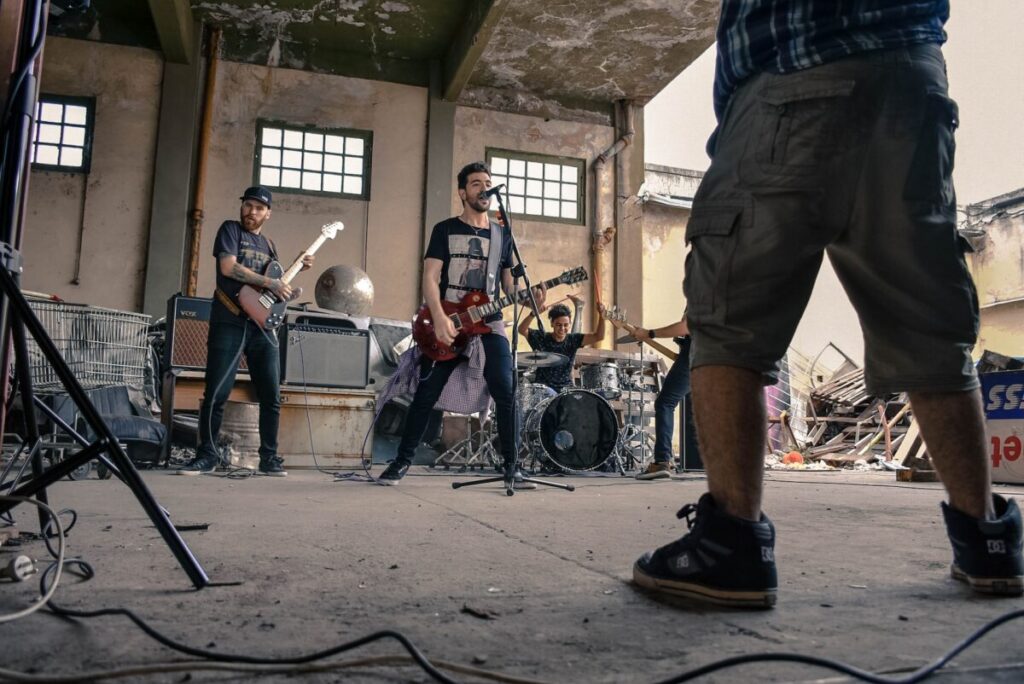The idea of having a garage band is nothing new. People have been doing it for decades — playing in the garage as a way to get in some solid practice, connect with bandmates, and perform for the neighborhood. But, while many garage musicians stay right where they are, it doesn’t have to be that way if you’re trying to make a career out of your passion.
Whether you’ve been playing for years or you’re just getting started, take the “garage band” idea seriously. With a little time and dedication, you can turn your garage into an epic music studio or jam space. By creating an acoustically optimized environment and letting your creativity shine through, you can utilize your garage as a stepping stone for your musical pursuits.
It’s a great way to practice in a live setting, it provides an opportunity to get creative with fellow bandmates, and can even be the spot where you record your first big demo. With that in mind, let’s cover some practical insights you can use to transform your garage into the ideal environment for making music.
Make the Most of the Space
You’re probably already using your garage for something else, either to park a car, store unused items, or as a tool shed. So, the first thing to consider is the logistics of transforming the space, especially if you’re on a budget.
Start by decluttering the space. Get rid of everything you don’t need or want, and consider donating or selling anything that might be valuable. Any money you make can be used in the transformation process. A clean space will give you a better idea of the kind of room you have to work with.
Once things are cleaned up, choose a floor plan and pay attention to detail when it comes to storage. You should be willing to utilize every inch of the garage, so consider adding things like shelving and even hooks or racks on the ceiling for extra storage space.
Make sure the area is properly ventilated, especially if you plan on converting it to a studio. Music studios can get stuffy quickly, and the last thing you want is for moisture to build up within the garage which could damage the expensive electrical equipment necessary to play and record. Plus, no one wants to work in a hot and stuffy environment.
If you’re stuck on a floor plan, consider your personal goals as a musician. Are you a solo artist or do you have a full band? Do you want to record in the garage or just jam? How much equipment will you have? When you think about why you want to transform your space, you’ll have a better idea of what you need to make it happen.
Making it Musical
Having enough space for equipment is a good place to start, but let’s face it — most garages aren’t known for their acoustics. If you’re trying to foster a good, quality sound in a big, empty space, you’re going to need to make some adjustments, starting with soundproofing the garage.
Not only will soundproofing improve the tone within the space, but it will keep your neighbors from getting upset! Some of the biggest benefits of noise reduction efforts include:
- Reducing echo
- Improving sound quality
- Improving focus
Typically, it’s easy to soundproof a garage if you have a little time and a few simple tools and materials. The type of soundproofing materials you’ll need depends on whether your garage is metal, wood, or brick.
You can soundproof the walls with insulation or foam, and switch the garage flooring to a durable carpet instead of concrete. When it comes to the garage door, you might need to add your soundproofing material behind the door to block soundwaves, especially if it rolls up. It will be difficult to add material directly to the door.
If you’re on a budget and still want to reduce noise and improve the acoustics in your garage, something as simple as hanging theater curtains over doors and windows can help absorb some of the sound. Keep things as insulated as possible with the materials you have on hand.
Respect Your Roommates
One of the potential drawbacks of practicing or recording in the garage is that it’s likely to be heard throughout the rest of the house. That might be fine if you live alone, but if you have a family or roommates and you’re spending hours blasting music through your living space multiple times a week, it could become a problem.
Soundproofing is one of the best ways to avoid this problem, but even then, some of the music, or even the vibrations, might be heard or felt throughout the house. So, if you’re going to play in the garage frequently, respect roommates and the people you live with by setting schedules, respecting their boundaries and personal space, and setting ground rules about your practicing habits. Consider offering options like:
- Playing at the same time each day
- Only playing for one hour at a time
- Agreeing to be flexible when people need quiet time
- Stopping by a certain time each night
- Only playing on certain days of the week
Discussing these things with your roommates or family members will foster better communication between everyone. There will be less room for confusion and irritation, and everyone will end up respecting each other’s needs much more easily.
No matter what your goals are as a musician, starting out in the garage is a great way to get your feet wet. Consider some of these ideas to transform your space and kickstart your career.
By Indiana Lee
